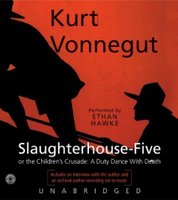
by
Douglas Adams
Read
Its all about books: from classics, to hard to get including banned books and audio books



Don't let the ease of reading fool you--Vonnegut's isn't a conventional, or simple, novel. He writes, "There are almost no characters in this story, and almost no dramatic confrontations, because most of the people in it are so sick, and so much the listless playthings of enormous forces. One of the main effects of war, after all, is that people are discouraged from being characters..." Slaughterhouse-Five (taken from the name of the building where the POWs were held) is not only Vonnegut's most powerful book, it is as important as any written since 1945. Like Catch-22, it fashions the author's experiences in the Second World War into an eloquent and deeply funny plea against butchery in the service of authority. Slaughterhouse-Five boasts the same imagination, humanity, and gleeful appreciation of the absurd found in Vonnegut's other works, but the book's basis in rock-hard, tragic fact gives it a unique poignancy--and humor.